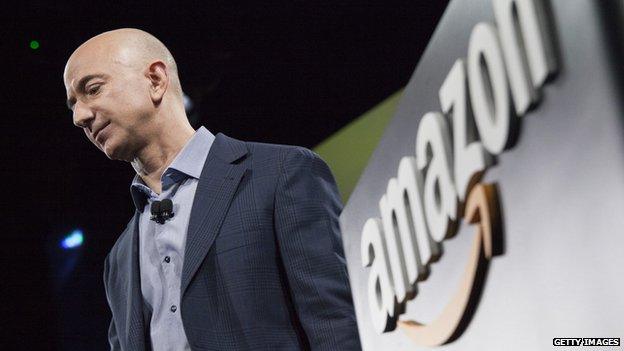Amazon boss Jeff Bezos defends company's workplace culture
- Published

Amazon's founder and chief executive refuted claims of "shockingly callous management practices"
The world's biggest online retailer is firing back against reports of an abusive corporate culture.
A New York Times, external report over the weekend described a demanding and degrading environment at Amazon.
Amazon's boss Jeff Bezos wrote in a memo to staff that the "article doesn't describe the Amazon I know".
The New York Times article quoted one former employee who said: "Nearly every person I worked with, I saw cry at their desk."
'Bruising' workplace
The report included testimonials from 100 current and former employees who depict a "bruising" workplace at Amazon, where employees are expected to "toil long and late".
Some claimed the company edged out workers who were suffering from personal crises, including miscarriages and cancer.
The article also said that the culture calls for employees to respond to emails after midnight. If they don't, they receive text messages demanding a swift response.
A press representative for Amazon said: "While we generally do not comment on individual news stories, we quickly saw current Amazon employees react."
He pointed to an article, external from Nick Ciubotariu, a current employee who said he never saw anyone cry in the office.

'Best of the best'
Mr Ciubotariu, head of infrastructure development, Amazon.com Search Experience, denied many of the claims made in the article on the professional networking website, LinkedIn.
He wrote: "No one tells me to work nights. No one makes me answer emails at night. No one texts me to ask me why emails aren't answered."
In Mr Bezos' memo, he encouraged Amazon employees to read the article, and email him directly if they recognised any of the "shockingly callous management practices" it described.
He wrote of the article: "It claims that our intentional approach is to create a soulless, dystopian workplace where no fun is had and no laughter heard. Again, I don't recognize this Amazon and I very much hope you don't, either."
Mr Bezos pointed out that the company depicted in the article could not survive in the "highly competitive tech hiring market".
He wrote: "The people we hire here are the best of the best. You are recruited every day by other world-class companies, and you can work anywhere you want."

From feedback, to fun: Five revelations about working at Amazon
"Anytime feedback": Amazon employees can privately relay feedback, both good and bad, to their colleagues' managers, whenever they want. While the New York Times article described this policy as an opportunity to sabotage co-workers, Amazon employee Nick Ciubotariu described as both "positive and constructive".
Where are the women? The New York Times referred to a "gender gap" at Amazon, saying the company does not have a single woman on its top leadership team. One of its officers, external is female, and Mr Ciubotariu wrote: "I have seen Amazon do more to encourage diversity than any other company I've worked for."
"Fun Fridays": Chief executive Jeff Bezos objected to the New York Times depiction of Amazon as a company "where no fun is had and no laughter heard". Mr Ciubotariu invoked the company's culture of fun in his LinkedIn post. "We have Nerf wars, almost daily, that often get a bit out of hand," he wrote.
Free food: Technology firms like Google and Facebook offer employees daily free buffets of food - not so at Amazon, says the New York Times. Mr Ciubotariu pointed out that Amazon's cafeteria is subsidised.
Working weekends: The New York Times said Amazon employees cited "marathon conference calls on Easter Sunday and Thanksgiving." Mr Ciubotariu said he had never worked a single weekend when he didn't want to. He did, however, take the time to write his lengthy rebuttal to the New York Times article on a Saturday.

- Published16 August 2015

- Published24 July 2015

- Published15 July 2015